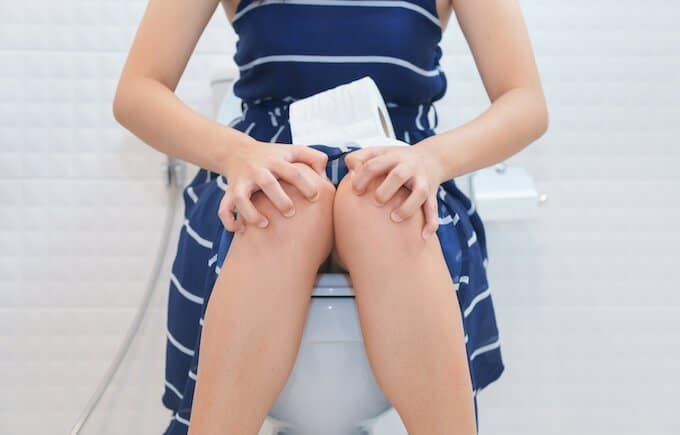Common Causes of Constipation
- Treatments, Testing and Diagnosis
If you are suffering from constipation, you will feel fatigued, bloated and uncomfortable. But what causes your constipation?
There are many causes of constipation and if you can find what causes your constipation then it is much easier to solve.
In this article, I am going to go through several causes of constipation. Have a read of each one and consider which one is affecting you.
Please note, symptoms alone are not enough to diagnose any digestive health problem. It is still important to go to your doctor to get an accurate diagnosis.

Not Eating Enough Fibre Can Lead To Constipation
You may not be eating enough fibre to help your bowels open. Most of us know about calories, but the problem is that we do not learn about fibre.
Fibre plays a few roles for helping with constipation;
- It feeds gut bacteria allowing it to thrive.
- It helps you form soft stools.
- It regulates your stools.
World-wide recommendations state you should be eating 30g of fibre daily. BUT, most people manage less than 20g a day (1).
You can find out how to increase your fibre intake to 30g a day by clicking here.
Dehydration Can Cause Constipation
Can you confidently say how much fluid you get daily? If not then dehydration may be your problem when it comes to constipation.
Fluid helps lubricate your stools, allowing you to go to the toilet with ease.
Recommendations suggest you should be drinking 6-8 glasses per day (2).
Lack of Exercise Can Contribute to Constipation
Reduced exercise levels are directly associated with constipation (3, 4).
As a nation we should be getting a minimum of 30 mins movement a day (continual). So use this as a baseline marker and to get yourself moving!!
Even if you are doing a few gym sessions in the week, how many days do you do nothing? On those days, do you sit behind a computer all day?
Slow Colonic Transit – a Type of Condition Which Causes Constipation
You may have constipation because your bowel does not react in the way it should do. Usually your bowel with contract to move food along the gut (5).
In some people, this nerve function does not work effectively. You may find that even laxatives do not work.
Food Allergy
You may expect food allergies to causes anaphylaxis. Whilst this is one symptom, not all allergies lead to this.
A type of food allergy called a non-IgE mediated food allergy can cause severe constipation (6).
Unfortunately, there are no tests for this type of food allergy. Instead, you will need to work with a dietitian who will use an elimination diet process to pin-point your problem food.
Pain Killers
If you are on opioid pain killers then you will notice that they cause constipation.
Opioid pain killers cause constipation by targeting the nervous system around your gut. This means that it is no longer able to push things about your bowel (7).
Needless to say, your doctor has prescribed these to you so you do need pain relief. Sometimes you can counteract the affect of opioid use by increasing fibre, fluid and exercise.
If you are still struggling, speak to your doctor as they may have an alternative for you.
Iron Supplements
You may have been prescribed iron supplements from your doctor if you have low levels. But you will find that these may cause constipation.
Constipation is a really common side affect of oral iron supplements and it will make you want to stop taking them (8).
It is thought that iron causes digestive problems for a few reasons
Eating Disorders are Linked to Constipation
Eating disorders have been linked to a range of digestive health problems including constipation (9).
If you have a current or previous eating disorder, it is important that you work with a specialist dietitian to address you bowel problems.
Conventional IBS management techniques such as the low FODMAP diet are not suitable as they may trigger or worsen your condition.
Defecatory Disorders
This disorder relates directly to your rectum (15). If you have it then your rectum is unable to open as it should.
Dietary changes are unlikely to help with this problem so see a specialist GI doctor for advice.
Age
As we get older, our risk of constipation increases.
One survey showed that constipation prevalence doubles to 33.5% in those who are 60 – 101 (16).
Summary
Constipation is a very common digestive problem. There are many causes of constipation (only some of which are listed here).
Finding out the cause of your problem can help you to solve it.
References
- https://www.thelancet.com/journals/lancet/article/PIIS0140-6736(18)31809-9/fulltext
- https://www.nhs.uk/news/food-and-diet/six-to-eight-glasses-of-water-still-best/
- https://www.ncbi.nlm.nih.gov/pubmed/12907334/
- https://www.ncbi.nlm.nih.gov/pubmed/12769807/
- https://www.ncbi.nlm.nih.gov/pmc/articles/PMC3531555/
- https://www.ncbi.nlm.nih.gov/pmc/articles/PMC5116302/
- https://www.ncbi.nlm.nih.gov/pmc/articles/PMC5914368/
- https://www.ncbi.nlm.nih.gov/pubmed/18644012/
- https://www.ncbi.nlm.nih.gov/pmc/articles/PMC4336293/
- https://www.ncbi.nlm.nih.gov/pubmed/21076126/
- https://www.ncbi.nlm.nih.gov/pubmed/12368409/
- https://www.ncbi.nlm.nih.gov/pubmed/9989688/
- https://www.ncbi.nlm.nih.gov/pubmed/22272265/
- https://www.ncbi.nlm.nih.gov/pubmed/20962160/
- https://www.ncbi.nlm.nih.gov/pubmed/16678564/
- https://www.ncbi.nlm.nih.gov/pubmed/16464225/